Related Research Articles

"The Long and Winding Road" is a song by the English rock band the Beatles from their 1970 album Let It Be. It was written by Paul McCartney and credited to Lennon–McCartney. When issued as a single in May 1970, a month after the Beatles' break-up, it became the group's 20th and last number-one hit on the Billboard Hot 100 chart in the United States.
"How Do You Sleep?" is a song by British rock musician John Lennon from his 1971 album Imagine. The song makes angry and scathing remarks aimed at his former Beatles bandmate and songwriting partner, Paul McCartney. Lennon wrote the song in response to what he perceived as personal slights by McCartney on the latter's Ram album. The track includes a slide guitar solo played by George Harrison and was co-produced by Lennon, Phil Spector and Yoko Ono.
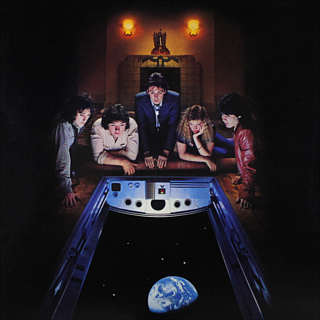
Back to the Egg is the seventh and final studio album by the British–American rock band Wings, released in June 1979 on Parlophone in the UK and Columbia Records in North America. Co-produced by Chris Thomas, the album reflects band leader Paul McCartney's embracing of contemporary musical trends such as new wave and punk, and marked the arrival of new Wings members Laurence Juber and Steve Holley. Back to the Egg adopts a loose conceptual theme around the idea of a working band, and its creation coincided with a period of considerable activity for the group, which included making a return to touring and work on several television and film projects.
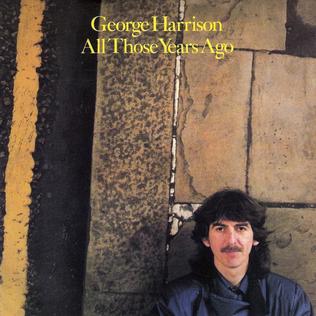
"All Those Years Ago" is a song by English musician George Harrison, released in May 1981 as a single from his album Somewhere in England. Having previously recorded the music for the song, Harrison tailored the lyrics to serve as a personal tribute to his former Beatles bandmate John Lennon, following the latter's murder in 1980. Ringo Starr is featured on drums, and Paul McCartney overdubbed backing vocals onto the basic track. The single spent three weeks at number 2 on the US Billboard Hot 100, behind "Bette Davis Eyes" by Kim Carnes, and it peaked at number 13 on the UK Singles Chart. It also topped Canada's RPM singles chart and spent one week at number 1 on Billboard's Adult Contemporary listings.

McCartney is the debut solo album by English musician Paul McCartney, released on 17 April 1970 by Apple Records. McCartney recorded it in secrecy, mostly using basic home-recording equipment at his house in St John's Wood. Mixing and some recording took place at professional London studios. In its loosely arranged performances, McCartney eschewed the polish of the Beatles' past records in favour of a lo-fi style. Apart from occasional contributions by his wife, Linda, McCartney performed the entire album alone by overdubbing on four-track tape.
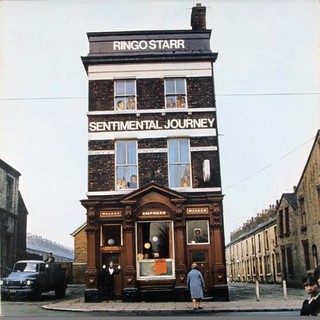
Sentimental Journey is the debut solo album by English rock musician Ringo Starr. It was released by Apple Records in March 1970 as the Beatles were breaking up. The album is a collection of pre-rock 'n' roll standards that Starr recalled from his childhood in Liverpool. As a departure from the experimental quality that had characterised solo LPs by George Harrison and John Lennon since 1968, it was the first studio album by an individual Beatle to embrace a popular music form.
"I'm the Greatest" is a song written by English musician John Lennon that was released as the opening track of the 1973 album Ringo by Ringo Starr. With Starr, Lennon and George Harrison appearing on the track, it marks the only time that three former Beatles recorded together between the band's break-up in 1970 and Lennon's death in 1980. Lennon wrote the song in December 1970 as a wry comment on his rise to fame, and later tailored the lyrics for Starr to sing. Named after one of Muhammad Ali's catchphrases, the song partly evokes the stage-show concept of the Beatles' 1967 album Sgt. Pepper's Lonely Hearts Club Band.

"The Back Seat of My Car" is a song written by Paul McCartney, released as the closing track of his and his wife Linda's 1971 album, Ram. Several months later, it was released as a single in the UK, peaking at number 39. The song modulates stylistically between a sweeping piano-and-orchestra ballad similar to McCartney's "The Long and Winding Road" and upbeat rock sections before ending in a raucous and passionate finale.

"Give Ireland Back to the Irish" is the debut single by the British–American rock band Wings that was released in February 1972. It was written by Paul McCartney and his wife Linda in response to the events of Bloody Sunday, on 30 January that year, when British troops in Northern Ireland shot dead thirteen civil rights protestors. Keen to voice their outrage at the killings, Wings recorded the track two days later at EMI Studios in London. It was the band's first song to include Northern Irish guitarist Henry McCullough.

"Back Off Boogaloo" is a song by English rock musician Ringo Starr that was released as a non-album single in March 1972. Starr's former Beatles bandmate George Harrison produced the recording and helped Starr write the song, although he remained uncredited as a co-writer until 2017. Recording took place in London shortly after the pair had appeared together at Harrison's Concert for Bangladesh shows in August 1971. The single was a follow-up to Starr's 1971 hit song "It Don't Come Easy" and continued his successful run as a solo artist. "Back Off Boogaloo" peaked at number 2 in Britain and Canada, and number 9 on America's Billboard Hot 100. It remains Starr's highest-charting single in the United Kingdom.
"Sue Me, Sue You Blues" is a song written by English musician George Harrison, released on his 1973 album Living in the Material World. Harrison initially let American guitarist Jesse Ed Davis record it for the latter's Ululu album (1972), in gratitude to Davis for his participation in the Concert for Bangladesh. When writing the song, Harrison drew inspiration from the legal issues surrounding the Beatles during the early months of 1971, particularly the lawsuit that Paul McCartney initiated in an effort to dissolve the band's business partnership, Apple Corps.
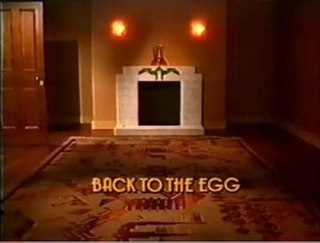
The Back to the Egg TV special was a program containing music videos to promote the band Wings' 1979 album Back to the Egg. The program was first broadcast on US television stations in November 1979, but its UK airing, on BBC1, was delayed until June 1981, two months after the band disbanded. The locations used for filming include Lympne Castle and Camber Sands, both on the south-east coast of England.
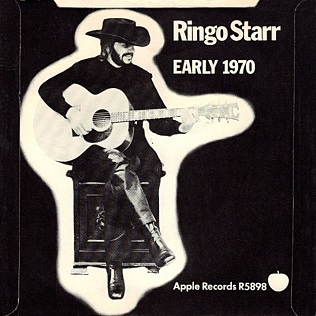
"Early 1970" is a song by English rock musician Ringo Starr that was released as the B-side of his April 1971 single "It Don't Come Easy". A rare example of Starr's songwriting at the time, it was inspired by the break-up of the Beatles and documents his relationship with his three former bandmates. The lyrics to the verses comment in turn on Paul McCartney, John Lennon and George Harrison as individuals, and the likelihood of each of them making music with Starr again. In the final verse, Starr offers a self-deprecating picture of his musical abilities and expresses the hope that all four will play together in the future. Commentators have variously described "Early 1970" as "a rough draft of a peace treaty" and "a disarming open letter" from Starr to Lennon, McCartney and Harrison.

James Paul McCartney is the title of a 1973 television special produced by ATV and starring English musician Paul McCartney and his then current rock group Wings. It was first broadcast on 16 April 1973 in the United States on the ABC network, and was later broadcast in the United Kingdom on 10 May 1973. It was issued on DVD as part of the super-deluxe Red Rose Speedway box set in December 2018.

"Run of the Mill" is a song by English musician George Harrison, released on his 1970 triple album All Things Must Pass. Harrison wrote the song shortly after the Beatles' troubled Get Back sessions in early 1969, during a period when his growth as a songwriter had inadvertently contributed to the dysfunction within the Beatles' group dynamic. The lyrics reflect the toll that running their company Apple Corps had taken on relationships within the band, especially between Paul McCartney and the other three Beatles, as well as Harrison's dismay at John Lennon's emotional withdrawal from the band. Commentators recognise "Run of the Mill" as one of several Harrison compositions that provide an insight into events behind the Beatles' break-up, particularly the difficulties surrounding Apple.
"The Lovely Linda" is a song by English musician Paul McCartney, released as the opening track of his debut solo album, McCartney, in April 1970. McCartney wrote the song to his first wife, Linda McCartney.
"See Yourself" is a song by English musician George Harrison, released on his 1976 album Thirty Three & 1/3. Harrison began writing the song in 1967, while he was a member of the Beatles, in response to the public outcry surrounding bandmate Paul McCartney's admission that he had taken the hallucinogenic drug LSD. McCartney's announcement created a reaction in the press similar to that caused in 1966 by John Lennon's statement that the Beatles were more popular than Christianity. In its finished form, the song's lyrics advocate self-awareness and consideration for the consequences of one's actions. Musically, the composition contains unusual shifts in time signature from standard 4/4 to 9/8, while the songwords reflect the era of its genesis by recalling themes first espoused in the Beatles tracks "Within You Without You" and "All You Need Is Love".

"What You Got" is a song written by John Lennon that was first released on his 1974 album Walls and Bridges. It was later released as the B-side to his top 10 #9 Dream single.
"Six O'Clock" is a song by English rock musician Ringo Starr from his 1973 album Ringo. It was written by Starr's former Beatles bandmate Paul McCartney and the latter's wife, Linda, who also participated in the recording of the song. It was the first time McCartney and Starr had worked together since the Beatles' break-up in 1970. Their collaboration reflected an easing of the tensions that had existed between the two musicians for much of that period.
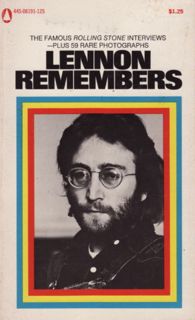
Lennon Remembers is a 1971 book by Rolling Stone magazine co-founder and editor Jann Wenner. It consists of a lengthy interview that Wenner carried out with former Beatle John Lennon in December 1970 and which was originally serialised in Rolling Stone in its issues dated 21 January and 4 February 1971. The interview was intended to promote Lennon's primal therapy-inspired album John Lennon/Plastic Ono Band and reflects the singer's emotions and mindset after undergoing an intense course of the therapy under Arthur Janov. It also serves as a rebuttal to Paul McCartney's public announcement of the Beatles' break-up, in April 1970.
References
- 1 2 "Here Today". AllMusic . Retrieved 16 July 2011.
- ↑ "Tug of War charts and awards". AllMusic . Retrieved 16 July 2011.
- 1 2 Madinger & Easter 2018, p. 265.
- ↑ "Keeping the Faith". The Paul McCartney project. Retrieved 21 August 2022.
- 1 2 3 "Paul McCartney: Here Today". The Beatles Bible. 21 July 2013. Retrieved 21 November 2016.
- 1 2 3 Harris, John (11 June 2004). "I'm still standing". The Guardian . ISSN 0261-3077 . Retrieved 16 November 2016.
- ↑ Badman 2001, p. 284.
- ↑ Madinger & Easter 2018, pp. 262, 265.
Sources
- Badman, Keith (2001). The Beatles Diary Volume 2: After The Break-Up 1970–2001. London: Omnibus Press. ISBN 0-7119-8307-0.
- Madinger, Chip; Easter, Mark (2018). Eight Arms to Hold You: The Solo Beatles Compendium (Remastered ed.). Chesterfield: Open Your Books. ISBN 978-0-615-11724-9.